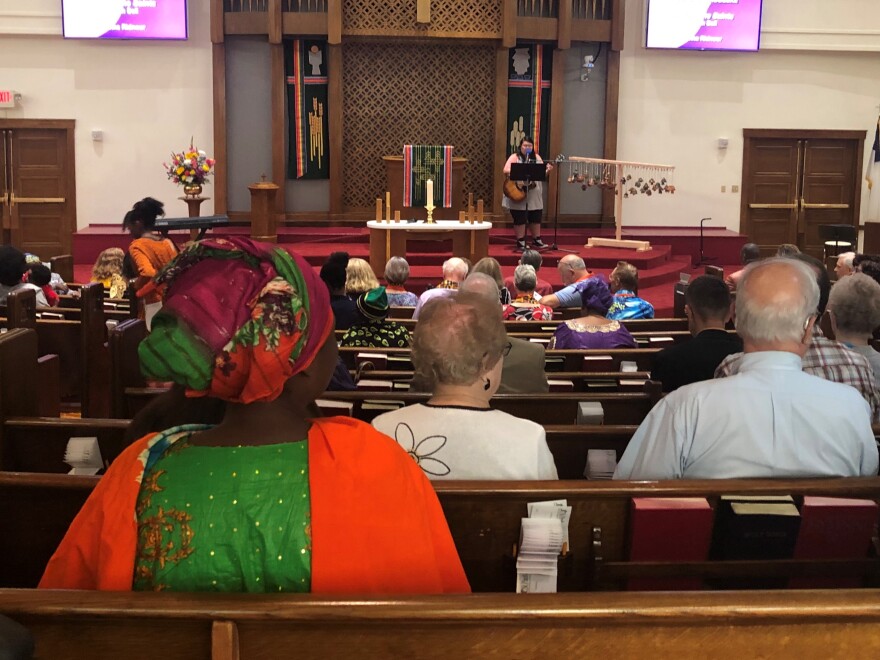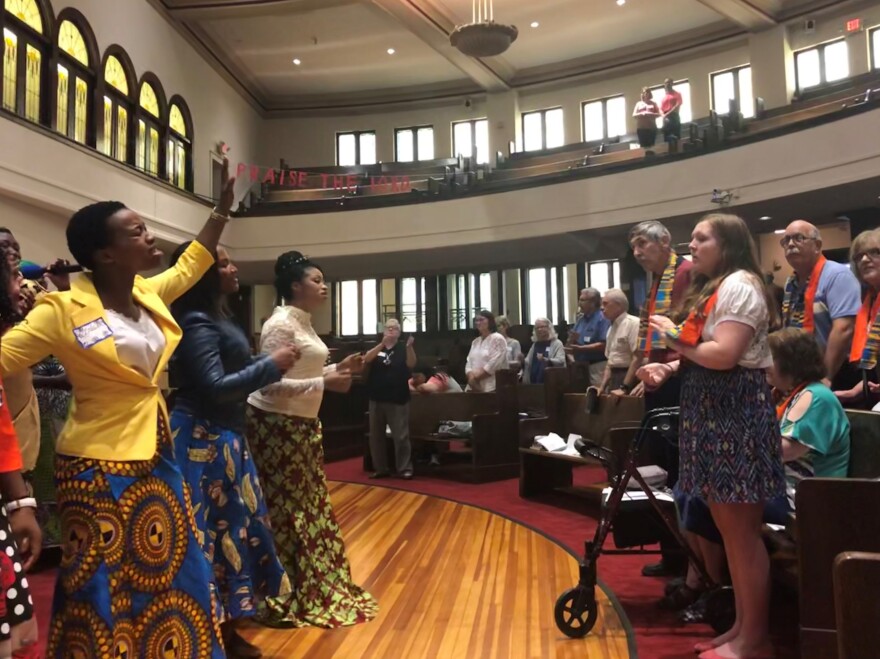Much of Iowa's slow but steady growth can be attributed to international immigration. While many native-born Iowans are leaving the state, some refugee communities are seeking it out. In many cases, they're deciding on a life in Iowa after initially settling in another state.
On a recent Sunday morning in Cedar Rapids, members of St. Paul’s United Methodist Church are worshipping in three languages: English, Swahili and Kirundi, a language spoken in Burundi, the Democratic Republic of Congo and Tanzania.
The church membership here did not look or sound like this, just 10 or 12 years ago.
Since then, the largely English-speaking congregation has been joined by a hundred new members from Central Africa, many of them refugees.
Mostly the two groups worship separately in their own primary languages, but today they’re all together, praying and singing in multiple languages, with interpretation provided by church members.

Pastor Daniel Niyonzima leads what the church call its African Nationals Congregation.
Like many refugees, he speaks multiple languages, which is important as a pastor of a diverse congregation.
“In Africa I speak, I spoke, French, Kirundi, Swahili, Kinyarwanda…” he said, listing them off.
He’s originally from Burundi, and has been preaching for years, including the 12 years he spent in a refugee camp in Tanzania, after fleeing his homeland in 1993.
Initially, the U.S. government resettled Niyonzima and his family in Rhode Island.
But like so many others, they decided to move to Iowa.
“Iowa is an area, a beautiful area to live. And it be quiet. Different than Chicago. Different than Tennessee,” Niyonzima said. “So if we live in Iowa, it’s a good state to live, especially for our children.”
Since Niyonzima has been in Cedar Rapids, more refugee families have relocated here, like Music Director Fidel Taylor, who changed his name when he became a citizen.
His family is Burundian, though he was born in a refugee camp in the Democratic Republic of Congo after they fled their home.
He moved from Atlanta, Ga. to Iowa while still in high school, attracted by a school system that he says felt safer.
“What attracted me to Iowa is the schooling system. It was great. I liked it. The behavior of the students…in order to get in to school from Georgia they have to search your backpack,” Taylor said.
Taylor says he knows many families in the Cedar Rapids refugee community that have chosen Iowa after initially being resettled in larger, more diverse states elsewhere in the country.
“The majority that we have here in Cedar Rapids, they didn’t come straight from Africa to here,” Taylor said.
Refugees have come from Illinois, Oregon, Montana, Virginia, North Carolina, New Jersey...
“Texas, California, Tennessee, Georgia, South Dakota...” he continued.

This trend is referred to as a secondary migration, a second wave of relocation within the country.
When refugees are first cleared to come to the U.S., they don’t have much of a say in where they’ll go.
States get federal funding based on how many refugees they expect to resettle.
For a set period of time, states will help refugees with bills, rent, language classes and job training.
When that support runs out, many face difficult decisions about what comes next.
So they check in with friends and family across the country.
“So there is a lot of jobs and how you know that is the community members, they share,” said Zack Balacha, a staffer at EMBARC, a refugee-led support organization based in Iowa.
Balacha fled his home in Eritrea and lived in Seattle and South Dakota before coming to Des Moines.
He says economics are a major factor in where refugees decide to live.
In Iowa, the rent is relatively affordable compared to other states and employers are desperate to hire workers.
Word travels fast in the community.
“Hey, I am working in this company and this, and here. And so for example some people work in Tyson in Marshalltown. So they would help others to compare,” Balacha said.
For many refugees, that’s enough for them to pack up their families and move again.
“No matter where you are from if you don’t have the knowledge of the area, if you are new to the area, you want to ask people, you want to find out, where is better? Where can I have a better job? That I can pay the rent and then support my family,” Balacha said.

This process of secondary migration can get complicated.
The state of Iowa’s refugee office says they have no way to count how many refugees are in this situation.
Once a family leaves the place where the government resettled them, it can be hard for agencies to know where they are, and what their needs are.
Balacha says often times the refugee community becomes its own support system and service provider.
“So if they pay your rent for 90 days, then after that nobody is going to pay your rent, in which you have to be self-sufficient,” Balacha said. “That’s why they have to make a decision to go to where they can get help from the community members.”
Because refugees can find work here and can afford to live here, the community follows.
St. Paul’s member Nifasha Verariya and her family fled their home in Burundi.
They were first resettled in San Diego, Calif., but found they couldn’t afford the rent. The family then relocated to Dillon, S.C. to work in a chicken processing plant.
Later the family heard from friends about a meat packing plant in the Cedar Rapids area that would pay even higher wages, enabling them to move out of the mobile home they were living in. So the family packed up and moved again.
Verariya, like many of Iowa’s refugees, now works at a meatpacking plant, commuting 90 minutes each day to Tama.
Verariya says she’s been able to build a life here in Iowa in a way she wouldn’t have in other states.
“My dad always said, I’m going to take you to a beautiful place,” she said. “I’m going to take you to a place where you’re going to have good schooling, you’re going to have a good life, you’re going to learn how to drive and have your own car. And it’s happening! I drive now and I’m finished with school. Most of the stuff that he said came true.”

But these moves can be difficult, and come with their own kind of loss. Juma Nakashenyi and his wife Aziza Yowali fled the Democratic Republic of Congo for a refugee camp in Zambia, where Aziza gave birth to three of their five children.
They were initially resettled in Durham, N.C., but left after hearing from friends about the lower cost of rent and number of job openings in Cedar Rapids.
It was painful to leave behind their community in North Carolina, and adjusting to Iowa’s bitterly cold winters has been very difficult, the couple says. Still, they’re planning to stay in Iowa for now, Juma says.
“This time, everybody decide to stay here. Even the children like it here,” he said.
“Even my wife now. She’s planning us to stay here. Before, she start to say, ‘here, no good’,” he said, laughing. “Concerning the weather, ‘oh we can’t stay here’. Better back in Carolina or another state which the weather is good [sic] than here.”
Juma and Aziza work second and third shifts at a shipping fulfillment center and a factory, while balancing their kids’ schooling and appointments with service organizations and non-profits.
But the Central African community that has grown in Cedar Rapids has helped them build new relationships and hold on to their culture. Nearby African grocery stores help Aziza hold on to the flavors of home.
“I buy the fish…tilapia,” she said. “Cassava,” she added, “fufu, rice, beans, potatoes…”
Their eldest son Ali is applying to colleges now, looking at in-state and out-of-state schools. Ali speaks five languages and often helps interpret for his parents.
He has dreams of going into criminal justice or medicine, dreams that could take him far from Cedar Rapids. He hasn’t made any final decisions about his college choice yet, saying with a smile that he has to get accepted first. And he has to think about his family, Ali said.
“When you go to the far colleges, like the other states’ colleges, it’s going to be really hard to come and visit the family. But if you stay around here it could be really easily [sic] to ask for help if it’s needed for the parents,” he said. “It’s going to take a little while to think about it.”
Fidel Taylor, the music director at St. Paul’s, said he’s not surprised why so many refugees come to Iowa to stay.
At a time when so many native-born Iowans are leaving the state, he said he’s not going anywhere. Ask him if he has any plans to move elsewhere and he’ll laugh.
“No, I never think of leaving Iowa,” he said rocking with laughter. “No!”
He loves his job as a professional interpreter, and leading choirs at St Paul’s.
He even likes the winter.
So why would he go anywhere else?
-----
Iowa In Focus is made possible by contributing members of Iowa Public Radio.
Your need to stay informed never takes a break, and neither does IPR. From daily newscasts and talk shows, to this Iowa In Focus series, you can rely on Iowa Public Radio to deliver insightful, fair-minded coverage that digs into the heart of the issue. Support this project, and the daily coverage that keeps you connected, by becoming a member today. Donate now.










